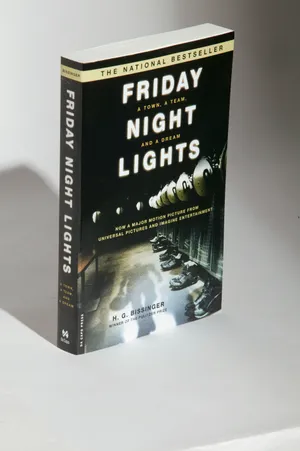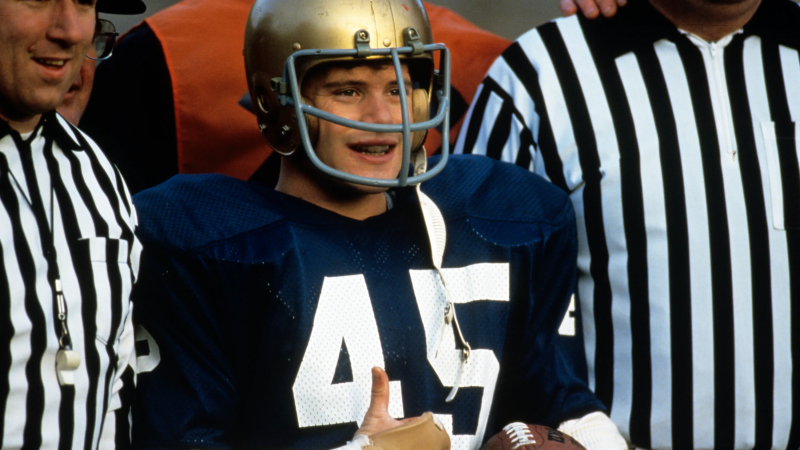'Friday Night Lights' author Buzz Bissinger is an unlikely hero in book-ban fight
This is a story about democracy and one of democracy's greatest tools − books. The freedom to read them. The ability to learn from them. Access to them. The fight to keep them from being banned.
Book-banning has been fought before in this country. It's just that no one thought there would be a massive book-banning movement in the 21st century. Especially Buzz Bissinger, author of one of the greatest sports books ever written, who has become an unlikely hero in what is an epic confrontation against book-banning.
"It's a frightening time right now, and all these book bans are getting out of control," Bissinger told USA TODAY Sports. "It's also going to be a snowball. The bans keep happening and spreading, and I feel like people aren't aware of this. Freedom of speech and freedom of democracy is what makes this country a great place, and we're seeing people try to reverse some of that by banning books."
Bissinger never believed he'd see the day one of his books was banned. Bissinger's "Friday Night Lights" examined life in a football-obsessed small town in Texas. In 2002, Sports Illustrated named it the fourth-best sports book of all time. It is deep and powerful, but nothing in it screams ban.
That apparently didn't matter to the Mason City Community School District in Iowa, which recently banned the book as part of school officials' compliance with a draconian new state law requiring books read by students to be “age-appropriate” and free of “descriptions or visual depictions of a sex act.”
That was the first part of this wacky and scary story.
"I was outraged," Bissinger told USA TODAY Sports. "I raised a ruckus and they listened."
Books by Bissinger, Toni Morrison, Alice Walker are banned
Originally, Iowa school administrators, under a tight deadline to meet the new law, and without the proper amount of staffing and resources, used ChatGPT to audit over 100 books. The chatbot, which is notoriously inaccurate, flagged 19 that violated the new state law, and Bissinger's was one of them.
After Bissinger publicly expressed his anger over the ban in an interview with The Philadelphia Inquirer, Bridgette Exman, the assistant superintendent of curriculum and instruction, reviewed Bissinger's work. A former English teacher, she'd read the book before but did so again to see whether it complied with the law. It did, so she reversed the ban of "Friday Night Lights" and several other books.
"The initial reaction to the ban was pretty brutal," Exman told USA TODAY Sports. "There were a lot of people upset with not just that the book was banned, but how it was banned. You put censorship and (artificial intelligence) together and I get it.
"I think overall these bans are a huge problem and not something I believe in," she said. "They are something most teachers are against."

Exman is another hero in this story because administrators like her, who live in parts of the nation pushing extremism and censorship, are on the front lines fighting for freedom of speech and democratic principles. It's not an exaggeration to say there's a book-banning surge that threatens to remove some of history's greatest published works from schools, and many of these bans focus on books that delve into race and the lives of the LGBTQ community.
In fact, Exman said books that remain banned in Mason City schools include "The Handmaid's Tale" by Margaret Atwood, Toni Morrison's "Beloved" (which won the Pulitzer Prize) and "The Color Purple" by Alice Walker (winner of the National Book Award).
"Do I feel good that my book is no longer banned? I do," said Bissinger, who recently authored "The Mosquito Bowl: A Game of Life and Death in World War II."
"But I hate that some of these other books, like Alice Walker's, are still banned," he said. "The idea overall that these kids need to be sheltered is a joke."
Surge in book bans starts with the '1619 Project'
It's not clear of the exact origins of the modern book-banning movement, but a sizeable portion started with right-wing reaction to the "1619 Project," a series of published works that examined how slavery impacts the lives of Black Americans today. Numerous conservatives attacked the project, and Florida Gov. Ron DeSantis essentially banned it from being taught in schools.
The banning would grow to almost anything related to critical race theory and then wokeness. The banning efforts have since expanded to gender and sexuality. Now, numerous books about many different subjects are under attack. PEN America counted more than 4,000 instances of book removals since the organization began tracking bans in July 2021. During one six-month period, the majority of books being banned, the organization states, were by and about people of color and the LGBTQ community. One official at PEN told the Washington Post in 2022 the higher number of bans was due to an increase in polarizing politics that included fights over "critical race theory."
A school district in Texas removed over 100 books from school libraries. One author who had her work removed, Ashley Hope Pérez, who wrote "Out of Dark-Ness," about a love affair between an African American teenager and a teenage Mexican American girl, pointed to how these bans target certain groups of people and not others.
"What's interesting and telling about these attacks is how much they focus on the experiences of Black, queer, non-white, non-dominant identities," she told MSNBC. "The white, middle class straight characters? They just don't seem to bother these folks, no matter how much sex those characters are having, or how violent their actions."
The noble actions of Bissinger and Exman are instructive. She and Bissinger had several email exchanges in which Bissinger pleaded his case and Exman listened. The listening part may seem basic, but in today's hyper-polarized world, it remains a rare thing.
"In the end, Buzz's reaction, because he has a voice, really emphasized the issue many districts like mine face," said Exman. "It put a light on the real shame of it all. How banning books in this way is just terrible. Not just in Iowa but across the country."

Exman also made a vital point that's often overlooked. One particularly despicable aspect of these laws is that they hold individual teachers accountable if the law is violated.
So Exman and others try to act as a forcefield for those teachers and protect them, while also trying to protect access to books, and doing all of that while attempting to comply with the law. "I saw an odious path," she said, "and I tried to take a less-horrible one."
Meaning the law gives Exman few options to fight it.
"The legislature and governor just dropped all of this in her lap with no guidance," Bissinger said of Exman. "She did the best she could. She's a hero in this story."
How extreme have things become? Exman said that until now, there hadn't been a formal book challenge in her district in over 20 years.
So yes, this is a story about democracy. Yes, it is a story about one of democracy's greatest tools, books. The freedom to read them. Having access to them.
This is also a story about the heroes who are fighting extremism. Heroes like Bissinger and Exman.

Disclaimer: The copyright of this article belongs to the original author. Reposting this article is solely for the purpose of information dissemination and does not constitute any investment advice. If there is any infringement, please contact us immediately. We will make corrections or deletions as necessary. Thank you.







